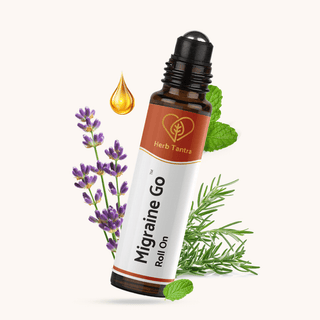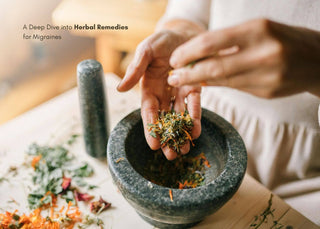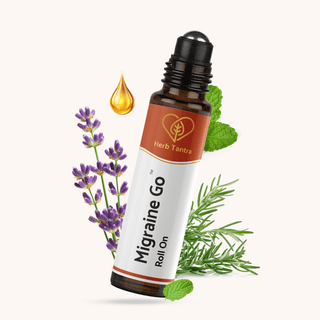Introduction
Migraines are more than just severe headaches—they can upend your day and affect every aspect of your life. While conventional medications may work for some, many people are now turning to herbal remedies as a form of natural treatment. In the realm of alternative medicine, these time-tested herbs provide migraine relief with fewer side effects. The current piece goes further into the topic of herbal migraine therapies, looking at the benefits, dosing, interactions, and safety issues of common herbs.
Herbal Remedies for Migraines
Herbal remedies have been used for centuries as natural treatments for migraines, offering a gentler approach compared to conventional pharmaceuticals. Below, we examine several key herbs, their properties, and why they are celebrated in the field of alternative medicine for providing migraine relief.
-
Butterbur is a well-researched herbal remedy for migraine relief, known for its anti-inflammatory and muscle-relaxing properties. Rich in petasin, it helps relax blood vessels and reduce migraine frequency and severity. Studies suggest that purified butterbur extracts provide natural treatment benefits without the harsh side effects of conventional medications, making it a valuable option in alternative medicine.
-
Feverfew is a traditional herbal remedy in alternative medicine, widely used for migraine relief. This flowering plant from the Asteraceae family has been a staple in European folk medicine for generations. Known for its anti-inflammatory and antispasmodic properties, feverfew is believed to reduce migraine frequency by inhibiting the release of inflammatory substances in the brain.
-
Ginger, a well-known herbal remedy, is more than just a kitchen spice—it’s a powerful natural treatment for various ailments, including migraine relief. ginger is rich in anti-inflammatory and antinausea compounds that help ease migraine pain and associated nausea. With its analgesic and antiemetic properties, ginger offers a gentle yet effective option in alternative medicine for managing migraines naturally.
-
Peppermint oil is a popular herbal remedy known for its cooling and calming effects, making it a valuable option for migraine relief. Extracted from peppermint leaves, this essential oil helps relax muscles and improve blood flow, offering rapid natural treatment for migraines. With its analgesic, cooling, and antispasmodic properties, peppermint oil is widely used in alternative medicine to ease headache discomfort effectively.

Shop Now Peppermint Oil For Migraine
-
Melaleuca quinquenervia (Niaouli) is a powerful herbal remedy often used in alternative medicine for its antiseptic and anti-inflammatory properties. It helps reduce inflammation and clear sinus congestion, both of which can contribute to migraine relief. With its decongestant and therapeutic qualities, niaouli serves as a natural and effective treatment for migraine sufferers.
-
Eucalyptus is widely recognized for its refreshing aroma and therapeutic benefits, making it a valuable natural treatment for migraine relief. Extracted from eucalyptus leaves, its essential oil is commonly used in aromatherapy to ease tension headaches. With its decongestant and anti-inflammatory properties, eucalyptus helps open nasal passages, improve breathing, and reduce migraine discomfort effectively.
-
Lavender Oil, extracted from lavender flowers, this essential oil is known for its calming fragrance and stress-reducing properties. By lowering cortisol levels, a common migraine trigger, lavender oil helps promote relaxation and improve sleep, making it an effective alternative medicine for migraine sufferers.
-
Holy Basil, or Tulsi, is a cherished herb in Ayurvedic medicine, renowned for its adaptogenic properties and role in natural treatments for stress-related ailments. As an alternative medicine, it helps reduce stress, a key trigger for migraines, while promoting mental clarity and neurological health. This makes it a valuable herbal remedy for those seeking migraine relief through holistic healing.
-
Cinnamon with its anti-inflammatory properties, it helps improve circulation and reduce headache symptoms. As an alternative medicine, cinnamon’s antioxidant and circulatory stimulant effects make it a promising herbal remedy for those seeking migraine relief through natural means.
-
Rosemary, known for its distinct aroma and medicinal benefits, is a valued herbal remedy in alternative medicine. Its ability to enhance blood circulation and reduce muscle tension makes it an effective option for migraine relief. By acting as a circulatory stimulant, mild analgesic, and anti-inflammatory, rosemary supports natural treatments that help alleviate headache symptoms and promote mental clarity.
Understanding Dosages and Potential Interactions with Medications
While herbal remedies offer promising migraine relief, it is crucial to use them responsibly. The correct dosage is key to ensuring both safety and efficacy. Many herbal supplements can interact with medications—for example, feverfew may affect blood thinning, and butterbur can be harmful if not properly purified.
Always consult with a healthcare professional before starting any new herbal regimen.
Appropriate dosages, taken in conjunction with your current treatment plan, can integrate seamlessly with natural treatments and alternative medicine practices, maximizing benefits while minimizing risks.

Explore Migraine Pain Relief Collection
Monitoring and Documenting Effects on Migraine Frequency and Severity
Keeping track of your migraine patterns and the effects of the herbal remedies It is essential for identifying what works best for you. Consider these practical tips:
-
Record the date, duration, and intensity of each migraine.
-
Note the herb, dosage, and form (tea, capsule, essential oil) you use.
-
Keep track of any side effects or improvements in associated symptoms, such as nausea.
-
Document foods, stressors, or weather changes that coincide with migraine episodes.
-
Compare your migraine frequency and severity before and after using the herbal remedies to gauge effectiveness.
Recognizing Potential Side Effects and Contraindications
Assessing the effectiveness and safety of herbal remedies is vital to ensure that you receive the best migraine relief. Consider both the potential benefits and any risks involved.
|
Herb |
Potential Side Effects / Contraindications |
|
Butterbur |
May cause liver toxicity if not purified; not recommended for pregnant or breastfeeding women. |
|
Feverfew |
Can lead to mouth ulcers or gastrointestinal upset; may interact with blood-thinning medications. |
|
Ginger |
High doses can cause heartburn or stomach discomfort. |
|
Peppermint Oil |
Skin irritation when applied undiluted; may worsen gastroesophageal reflux in sensitive individuals. |
|
Melaleuca quinquenervia |
In concentrated forms, it may cause skin irritation; caution is advised for individuals with sensitive skin. |
|
Eucalyptus |
Can be toxic if ingested in large quantities; may trigger allergic reactions. |
|
Lavender Oil |
Potential allergic reactions; should be diluted before topical application. |
|
Holy Basil (Tulsi) |
May lower blood sugar levels; caution needed for individuals with hypoglycemia or diabetes. |
|
Cinnamon |
Excessive use may lead to liver issues due to coumarin content; can cause mouth irritation. |
|
Rosemary |
High doses might cause allergic reactions in sensitive individuals; moderation is key. |
The Importance of Quality and Purity in Herbal Supplement Selection
When choosing herbal remedies for migraine relief, quality and purity are paramount. The market is flooded with supplements that vary in quality, and only those that are certified pure and free from contaminants should be trusted. High-quality herbal products, produced under strict guidelines, ensure that the beneficial compounds remain effective.
Conclusion
Herbal remedies offer a promising, natural avenue for managing migraine pain. With options like butterbur, feverfew, ginger, peppermint oil, melaleuca quinquenervia, eucalyptus, lavender oil, Holy Basil, cinnamon, and rosemary, individuals have a range of natural treatments at their disposal. These alternative medicine approaches not only focus on mitigating migraine attacks but also work to improve overall well-being through holistic care.
By understanding the proper dosages, recognizing potential interactions, and monitoring your progress carefully, you can achieve significant migraine relief with herbal remedies. For high-quality, natural herbal solutions, explore Herb Tantra's range of products and take a step towards migraine-free living today.
FAQs
Q1. What lifestyle changes can help prevent migraines?
Maintaining a consistent sleep schedule, managing stress through exercise or meditation, and avoiding common dietary triggers can help prevent migraine attacks.
Q2. How does sleep influence migraine frequency?
Consistent, quality sleep is essential for regulating the body’s chemistry. Poor sleep can disturb neurotransmitter levels and increase stress, leading to more frequent migraines.
Q3. How did I cure my migraines naturally?
Many find relief by combining herbal remedies with healthy lifestyle changes. For instance, I integrated feverfew and ginger into my routine, maintained regular sleep patterns, and kept a migraine diary to adjust my natural treatments effectively over time.
Q4. What is the best drink for a migraine?
Ginger tea or a peppermint-infused water can serve as excellent adjuncts for migraine relief, acting as part of a comprehensive approach that includes herbal remedies and proper hydration.
Q5. What plant is good for migraines?
Many people have found success with herbs such as butterbur, feverfew, and Holy Basil (Tulsi). These natural treatments are highly regarded in alternative medicine for reducing migraine frequency and severity.

















